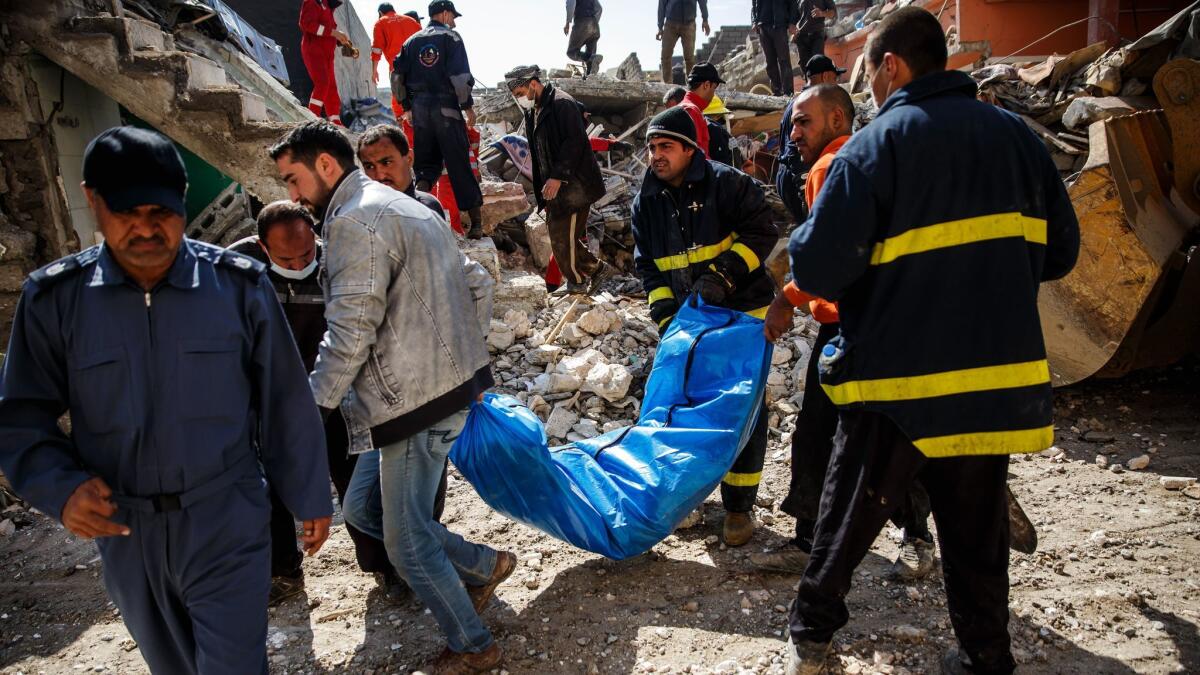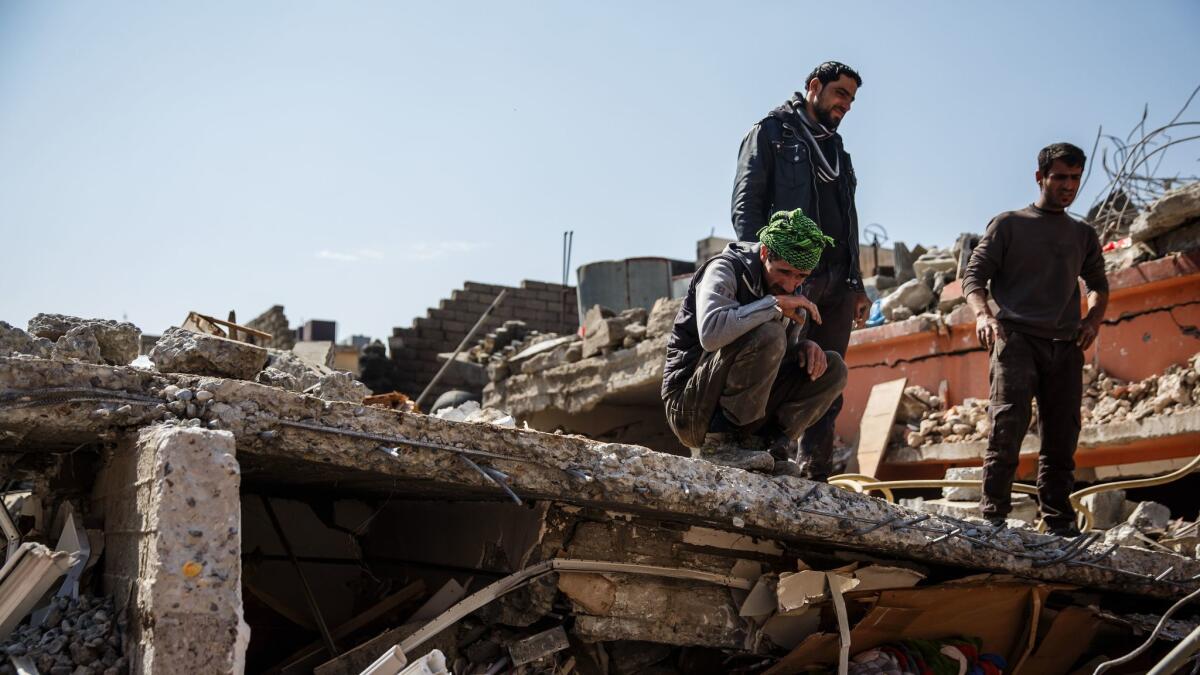U.S. airstrike was responsible for civilian deaths in Mosul, Iraqi officials say

Reporting from Baghdad â A top Iraqi military officer said Wednesday it was clear that the devastating explosion on the west Mosul neighborhood of Jadidah this month was a U.S. airstrike, but he insisted the troops that requested it didnât realize civilians were present.
With as many as 200 people killed â the largest civilian death toll in decades from a U.S. airstrike â the March 17 attack has become a public relations nightmare for the internationally backed effort by the Iraqi military to drive Islamic State militants out of the countryâs second-largest city.
In an interview in Baghdad, Gen. Talib Shaghati Kenani, the leader of Iraqâs elite counter-terrorism service, said Iraqi forces that ordered the airstrike âdidnât know about civilians in the areaâ and were focused on killing the militants.
Sharwan Kamil Waely, a security policy advisor to the Iraqi president, called the airstrike âa mistakeâ and âa tragedy for Iraqisâ that had âcreated an obstacle for us.â
He said Iraqi officials intended to question the U.S. military about why the pilot followed through on the request for the airstrike. âAt the final minute, the final instant, the pilot has the authority to act because it is a moving target,â he said.

The Iraqi officials backed away from earlier claims that Islamic State bombs caused the explosion. Still, the terrorist group appears to have engineered the devastation in what officials said is a new strategy. Mounting evidence from the scene and witness testimony suggest that militants herded civilians into an apartment block, then placed a sniper on the roof to provoke an airstrike.
From his hospital bed this week, Abdullah Xalil Mutar told Iraqi military investigators what he saw moments before the massive blast leveled an entire city block.
âIt was an airstrike,â he said. âWe heard the sound of the jet fire and we heard the rocket.â
The 47-year-old truck driver and his family survived the blast that destroyed their house. He remained hospitalized Wednesday in the city of Irbil, 50 miles from Mosul, for a series of surgeries to treat burns on his back and foot.
Another witness, 37-year-old Mubishar Thanoon, who was visiting his brother in the hospital Wednesday, said Iraqi soldiers were fighting militants in the neighborhood before the blast and so had to have known that civilians were still in the area.
U.S. officials have said that the coalition was probably responsible for the blast but did not rule out other possibilities. American and Iraqi investigators were still sifting through the rubble in Jadidah on Wednesday.
U.S. military analysts were reviewing more than 700 videos recorded over a 10-day period before, during and after the airstrike for footage of Islamic State forcing people into the building.
Islamic State has long used civilians as human shields to deter airstrikes. Its commanders walk alongside children while in public, dart through holes and tunnels carved in civilian homes and set up headquarters in mosques, hospitals and schools.
Gen. Joseph Votel, the top U.S. commander in the Middle East, told a congressional panel Wednesday that the strategy is âa way to distract our campaign.â
âAs we move into these urban environments, it is going to become more and more difficult to apply an extraordinarily high standardâ to prevent civilian casualties, he said.
When civilians are killed, Islamic State uses the deaths in propaganda efforts to turn the population against the Iraqi army and the international coalition.
On Monday, a news agency affiliated with the group released a video that claimed to show unarmed civilians injured by a recent coalition airstrike on a maternity hospital in west Mosulâs Zanjili neighborhood. The strike has not been substantiated.
An old man, his face bloodied, stares at the camera, which then turns to dead bodies, including an infant with a hole above his heart.
âWe didnât have any weapons or anything,â says a young man leaning against a wall.
Meanwhile, the fighting in west Mosul has intensified, with more than 1,100 munitions from the air and ground launched over the last week. At the same time, Iraqi military officials said the destruction in Jadidah had caused them to be more cautious in requesting airstrikes.
âOur main goal is to keep the civilians alive,â Kenani said. âThatâs our main mission.â
Waely said Iraqi forces were now ârearranging the planâ for how they used intelligence information to order airstrikes.
Hennessy-Fiske reported from Baghdad and Hennigan from Washington.
ALSO:
Climate change is real: Just ask the Pentagon
Overweight, tattooed, stoned? The Pentagon may still want you
More to Read
Sign up for Essential California
The most important California stories and recommendations in your inbox every morning.
You may occasionally receive promotional content from the Los Angeles Times.












